August 03, 2016
The Trial of the Digital Century
Could the cellphone – one of the greatest inventions in history – actually be sabotaging your career? We present the case. You decide the verdict.
Is the smartphone more curse than blessing?
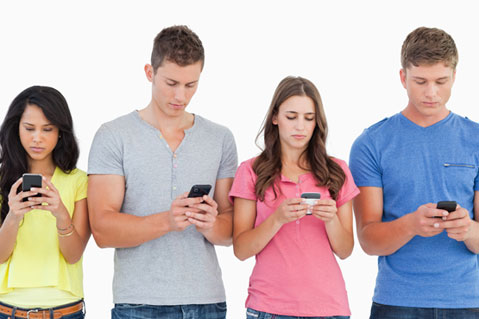
At first glance, the question might seem ridiculous. The constant connectivity mobile phones provide, many say, enables salespeople to be more efficient, productive and adaptable.
Nonetheless, a growing body of research suggests that smartphones may be a double-edged sword, negatively affecting everything from critical thinking to the ability to form relationships.
In this feature, Advantages presents both sides of the argument, with opinions from academics and salespeople, along with data from various studies. Then, after laying out the case, we offer up nine strategies to help you master in-person communication – a lost art in a digital age where face-to-face time is at a premium.
THE TRIAL
The Charge: Despite their upside, smartphones are guilty of causing a myriad of negative impacts that, on the whole, do more to weaken on-the-job performance than improve it.
The Prosecution’s Case
Opening Statement: Through expert testimony and exhibits, the prosecution will demonstrate that smartphones can diminish attention span, impair cognitive function and detract from people’s capacity to connect with each other – all of which can inhibit salespeople’s ability to succeed.
 While at Florida State University, Stothart led a study that found simply receiving a notification on your cellphone can significantly impair your ability to focus on a given task. Both sound and vibration notifications are so distracting that they’re comparable in scale to actively using a phone to call or text, the study showed.
While at Florida State University, Stothart led a study that found simply receiving a notification on your cellphone can significantly impair your ability to focus on a given task. Both sound and vibration notifications are so distracting that they’re comparable in scale to actively using a phone to call or text, the study showed.
To conduct the study – “The Attentional Cost of Receiving a Cell Notification” – Stothart and his fellow researchers had participants engage in a focus-intensive computer task. During a part of the study, the researchers sent automated calls or texts to the personal phones of some participants. The result? Participants who received notifications made more mistakes and fared worse on the task than those who received no calls or texts. Indeed, the probability of committing an error was more than three times greater among those who received notifications.
“We think that mind wandering – thinking about things that are task-unrelated – is behind the effect,” says Stothart. “Mind wandering requires cognitive resources, something that we only have a limited pool of. So, when we mind wander, we risk taking away resources that are being used for our current task.” Especially disconcerting is the fact that the more mental power (cognitive resources) that people need for a task, the more performance suffers from mind wandering, Stothart says.
 It’s well-documented that talking or texting on a cellphone can diminish performance when multitasking – think distracted driving. But in a study published in Social Psychology, Thornton and his fellow researchers go a step further, concluding that the mere presence of a cellphone may be sufficiently distracting to reduce attention span and detract from task-performance. The effect is even more pronounced when people are engaged in more mentally challenging activities. Such findings suggest that simply seeing your cellphone in front of you can potentially contribute to poorer performance on the job.
It’s well-documented that talking or texting on a cellphone can diminish performance when multitasking – think distracted driving. But in a study published in Social Psychology, Thornton and his fellow researchers go a step further, concluding that the mere presence of a cellphone may be sufficiently distracting to reduce attention span and detract from task-performance. The effect is even more pronounced when people are engaged in more mentally challenging activities. Such findings suggest that simply seeing your cellphone in front of you can potentially contribute to poorer performance on the job.
For the study, Thornton and his team had students in separate statistics classes engage in attention-testing tasks. One activity was relatively straightforward, the other more complicated. In both tasks, researchers presented participants with a page of 20 rows of numbers singly spaced.
In the easier task, a row of digits was preceded by a “target number” that participants had to circle. Then, they had to cross off the number each time it appeared in that row. Participants did the same thing on the next row with a different target number.
Meanwhile, the more challenging assignment involved what’s called additive cancellation. Again, each row of digits was preceded by a “target number” that the subject had to circle. But this time, participants were challenged to then cross off any two adjacent numbers that “added up” to their target number.
 In one of the statistics classes, students kept their phones on their desks while they worked on tasks. In the other, phones were out of sight.
In one of the statistics classes, students kept their phones on their desks while they worked on tasks. In the other, phones were out of sight.
In the end, Thornton and his colleagues found that students who didn’t see their phones did better on both tasks – especially the more complicated one, getting an average of 26 correct compared to the other group’s 21. “The more complex the task, the greater the impact is going to be,” says Thornton.
The likely reason even an idle cellphone is such a distraction is because of what it’s associated with in people’s minds – social connections, information, access to fun and diversion. “It’s a classically conditioned stimulus,” says Thornton. “You see the cellphone and you may think about the things associated with it.” And that, as the study shows, can prove quite distracting.
In a 2012 study published in the Journal of Social and Personal Relationships, Przybylski and colleague Dr. Netta Weinstein evaluated the influence that mobile phones can have on relationship quality in dyadic face-to-face settings. In experiments detailed in the study, the researchers had people engage in relationship-forming tasks rooted in conversations that ranged from the casual to more meaningful. A mobile phone was left nondescriptly in the room with some participating pairs, but not others.
By study’s end, the researchers found evidence that the presence of mobile phones inhibited the development of interpersonal closeness and trust, and reduced the extent to which participants felt empathy and understanding from their partners. “These results demonstrate that the presence of mobile phones can interfere with human relationships, an effect that is most clear when individuals are discussing personally meaningful topics,” the researchers wrote.
Especially interesting, according to the researchers, is that people might not be cognizant of the phone’s interfering influence. “The debriefing procedure suggests that these effects might happen outside of conscious awareness,” Przybylski and Weinstein say.

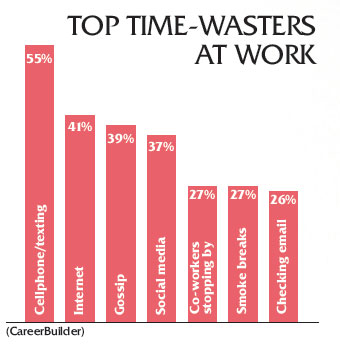
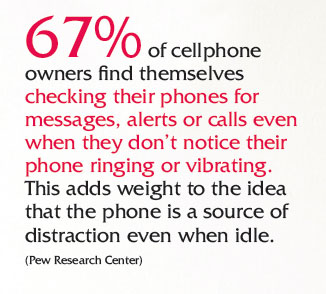
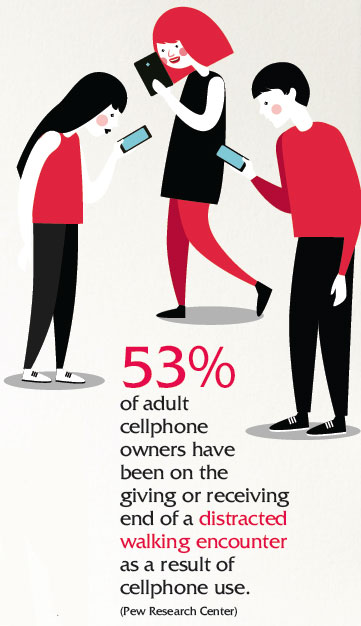
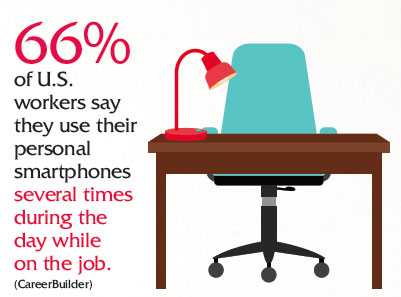
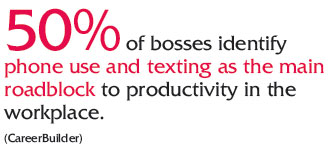
The Defense’s Case
Opening Statement: Through exhibits and first-person testimony from promo product professionals, the defense will demonstrate that smartphones can be valuable tools that help propel productivity, while making the lives of salespeople easier. The evidence will show that the good derived from smartphones far outweighs the negatives.
 I believe that people, not objects, are productive – or not productive, as the case may be. As such, it’s best to hire productive people and let them use tools, like smartphones, that have the potential to facilitate their productivity. It’s not the phone itself that makes someone productive or diminishes their productivity, but rather how the person uses the phone. And how they use it is down to the makeup of that person.
I believe that people, not objects, are productive – or not productive, as the case may be. As such, it’s best to hire productive people and let them use tools, like smartphones, that have the potential to facilitate their productivity. It’s not the phone itself that makes someone productive or diminishes their productivity, but rather how the person uses the phone. And how they use it is down to the makeup of that person.
Here’s a taste of what I mean: A small-business owner walks into an office shared by three outside sales reps. One is face down on his computer screen doing what appears to be product research, a second is tapping away on her cellphone screen, and the third is taking a cellphone call from her daughter.
The small-business owner instantly asks himself, “Are cellphones nothing more than a distraction?” He thinks, “Yes, a cellphone gives you much quicker access to a given person and even faster access to data online. However, it also makes it much easier to focus on social media, games like Candy Crush, and to have a family member interrupt your day.”
The owner stops his three employees and asks them all to explain what they’re doing. The employee with his head down on his PC was working through his emails. The second employee tapping on her screen was confirming a meeting with a new client via text. The third employee taking the call from her daughter was working out the details to have her picked up by her husband so she could work late on a big project. In short, they were all being productive, which goes back to what I said at the beginning: It’s people, and how they use the devices at their disposal, that make the difference.
 My smartphone is an important tool that I use to get through my day as productively, efficiently and profitably as possible. Here’s a little “day-in-the-life” experience I had recently that reminded me just how cool this little gadget is.
My smartphone is an important tool that I use to get through my day as productively, efficiently and profitably as possible. Here’s a little “day-in-the-life” experience I had recently that reminded me just how cool this little gadget is.
Cruising to my first appointment with a new prospect in a city I wasn’t familiar with, I had my phone’s navigation directing me which way to go. Thanks in part to the great directions from my phone’s GPS, I arrived about half an hour early. To make good use of the time, I kept the phone out and checked my voicemail – where I found an important message. I quickly returned the call to a supplier, who needed another artwork file for an order. I then hopped off the call, swiped over to the mobile app for my desktop, downloaded the artwork and emailed it over to the supplier.
I still had 15 minutes, so I scrolled through my emails and found a note from a previous buyer for one of my clients. She was now with a new company and needed a quote within the hour on some promotional items for an upcoming event. I swiped across my phone’s screen, tapped on the ESP Mobile app, and found the product ideas she was looking for. With a few taps, I sent the quote right back to her. I still had a few minutes, so I tossed out a quick “Hello” on a couple social media sites, then turned my phone to silent and headed into my appointment.
During the conversation with my new prospect, we discussed several product options and I used my phone to email them from across the table. The prospect agreed to move forward with the order. And with a handshake, I was on my way, having had a productive and prosperous day, despite being out of the office.
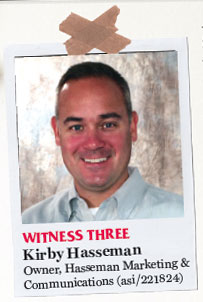 For me, the key to having my smartphone be truly “smart” lies with me – with my ability to control the phone versus letting it control me. If you control your phone use, you have the ability to vastly increase your productivity and efficiency. There are so many effective mobile apps out there that can help you organize and manage your day so you can be efficient with your time. Relatedly, I love the fact that I can sync my smartphone, my iPad and my laptop in the cloud so they all have the same information at the same time. Plus, having all your contacts, calendar and a calculator one tap away saves an incredible amount of time.
For me, the key to having my smartphone be truly “smart” lies with me – with my ability to control the phone versus letting it control me. If you control your phone use, you have the ability to vastly increase your productivity and efficiency. There are so many effective mobile apps out there that can help you organize and manage your day so you can be efficient with your time. Relatedly, I love the fact that I can sync my smartphone, my iPad and my laptop in the cloud so they all have the same information at the same time. Plus, having all your contacts, calendar and a calculator one tap away saves an incredible amount of time.
At this point, it’s next to impossible to imagine my business or personal life without my smartphone. In addition to the obvious ability to instantly connect to email and calendar, my mobile device helps to make me a media company.
For instance, I use it to promote my business through social media channels and to create content. The content includes videos for clients, as well as videos for my company. What really makes the phone a key asset is the flexibility of communication format that it offers. No matter how my clients want to reach me – text, email, Facebook, Twitter or Snapchat – they can do it. They get to choose the platform that makes the most sense to them, and I have access to them and that dialog because of my phone.
In addition, with a wife and two teenage girls, my smartphone is my way of staying in touch with my family while I navigate a hectic work schedule.
I totally understand the need to occasionally provide yourself space from business (and yes, I struggle with that). But for me, it’s about being intentional. I disconnect when I need to do it. But I can’t picture doing business, or life, without access to my phone.


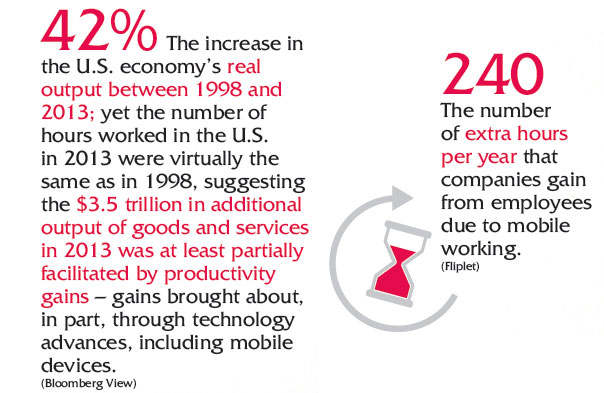
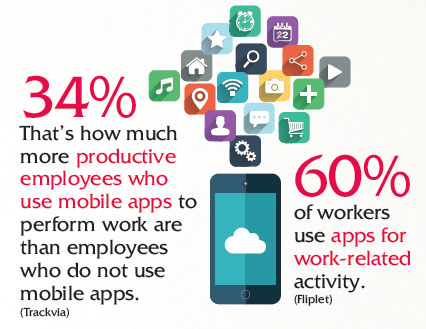
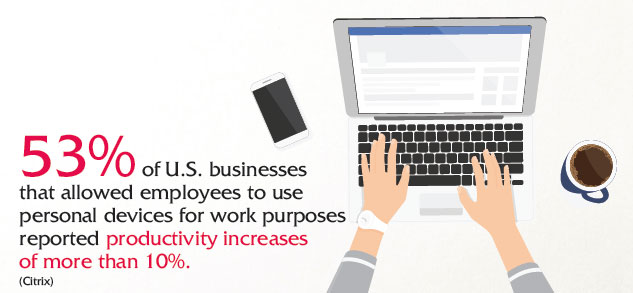
DEFENSE CLOSING ARGUMENT
While only three witnesses testified, hundreds, if not thousands, more professionals could’ve detailed similar positive results related to their smartphone use. In different ways, all three witnesses testified that if salespeople responsibly manage their mobile phones, then the devices will have little to no drag on their productivity or ability to function at the highest level. In fact, as the hard numbers in the exhibits further indicate, the opposite is true: Mobile devices help power productivity – even to unprecedented levels.
PROSECUTION CLOSING ARGUMENT
Admit it, part of you wishes cellphones didn’t exist. The days of 24/7 communication can be wearing. Plus, smartphones give clients and prospects an excuse for not meeting you in person, so they can more easily ignore you. Consider the testimony. The first witness suggests that smartphone notifications can distract salespeople from pressing tasks. The second witness implies that just seeing a mobile device can degrade the mental power needed to problem-solve – a significant issue for promo salespeople because adaptivity and creative thinking are essential to success.
Perhaps most damning, the third witness makes the case that mobile phones can be detrimental to forming relationships – a huge issue for salespeople who must forge firm ties with clients to help ensure buyer loyalty. Sure, some salespeople use cellphones to boost productivity, but they’re the exception. For most salespeople, their smartphones are a crutch, or even worse, a detriment.
The Verdict
Do you think cellphones actually prevent salespeople from being more productive? Or are they indispensable tools that help salespeople in their careers? Vote now!
>> 9 Strategies to Master In-Person Communication
Christopher Ruvo is a senior writer for Advantages. Follow: @ChrisR_ASI. Contact: cruvo@asicentral.com